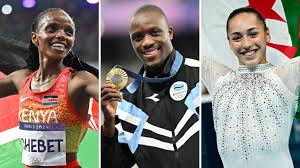
Africa’s Olympic Potential: Roadmap to Future Success
The 2024 Paris Olympics have concluded, revealing both successes and shortcomings for African nations. While countries like Kenya, Botswana, Algeria, and South Africa managed to secure medals and maintain their traditions of excellence, other nations, particularly from West and Central Africa, struggled significantly. This mixed performance highlights Africa’s vast potential and the critical areas requiring improvement to fully harness it.
Kenya’s impressive showing, with 11 medals including 4 golds, showcased its dominance in middle- and long-distance running. However, this success was not reflected across the continent, with many nations, including Nigeria, failing to secure any medals despite substantial resources and a large contingent. This discrepancy has led to public apologies from officials and raised concerns about sports development in the region.
The underlying issue is not a lack of talent but rather the inadequate infrastructure and resources necessary to develop this talent effectively. Many African-born athletes competing for other countries have excelled, underscoring the continent’s potential. Yet, systemic failures in sports administration and development have led to missed opportunities and underperformance.
Botswana’s 200-meter gold medalist, Letsile Tebogo, highlighted the critical need for better resources and facilities in Africa. Tebogo emphasized the scarcity of essential training resources on the continent, pointing out that many athletes must travel abroad for proper training and recovery. This situation reflects a broader struggle, as African athletes often train under suboptimal conditions.
To address these challenges, a unified approach to building sports infrastructure is necessary. Establishing regional centers of excellence across Africa, equipped with world-class facilities and support systems, could significantly enhance athlete development. Additionally, reviving grassroots sports programs, investing in local competitions, and creating pathways for young athletes are crucial for long-term success.
Collaboration between governments and the private sector is essential for securing funding and sponsorships for sports development. Effective partnerships can help create a sustainable model that benefits not just the athletes but also promotes national pride and social cohesion.
Moreover, improving the governance of sports federations is critical. Addressing issues of poor management, corruption, and inefficiency is essential for effective sports development. Competent leadership and transparent use of funds are necessary to support infrastructure and training improvements.
The success of nations like Jamaica in athletics serves as a model for what can be achieved with a strategic approach. African countries need to integrate sports into national development plans, with clear goals and long-term strategies. As Tebogo aptly noted, increasing and utilizing available resources effectively is key to success.
The upcoming 2026 Youth Olympic Games in Dakar, Senegal, will be a significant opportunity for Africa to showcase its potential both as a host and a competitor. By focusing on developing young talent and investing in infrastructure, Africa can make substantial progress toward becoming a global sports powerhouse.
In summary, Africa’s Olympic potential is clear, but realizing it requires a concerted effort to address infrastructure, grassroots development, governance, and long-term planning. With the right strategies, the continent can achieve remarkable success on the global sports stage.
